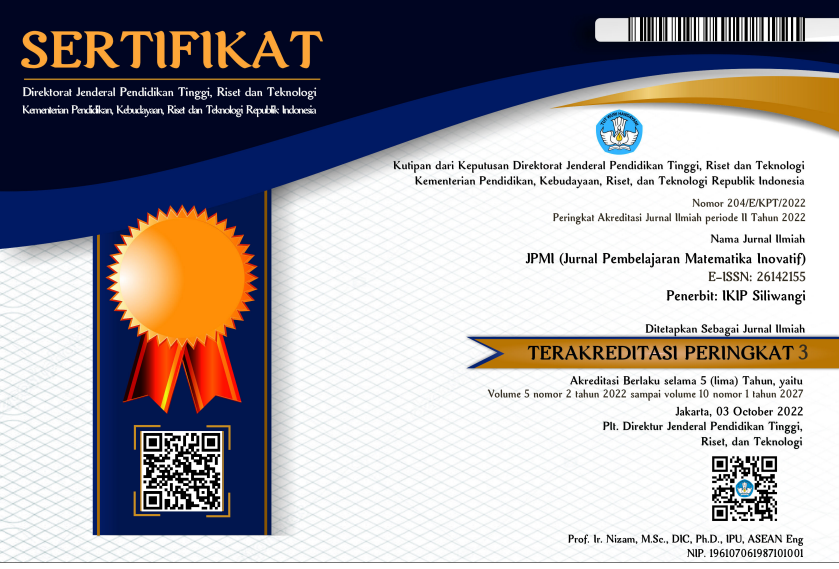PENGARUH MOTIVASI BELAJAR TERHADAP HASIL BELAJAR SISWA SMP PADA MATERI STATISTIKA
DOI:
https://doi.org/10.22460/jpmi.v6i1.11922Kata Kunci:
Students Learning Outcomes, Learning Motivation, StatisticsAbstrak
Covid-19 is a rapidly growing outbreak around the world, one of the obvious impacts is the education sector. Inadequate education affects the learning outcomes of learners. One of the factors that affect student learning outcomes is the presence of motivation that comes from the student itself. Without the willingness to learn, it can be difficult for students to know what to learn and why they need to learn it. The research used is correlational and ex-post facto research using quantitative approaches that aim to find out whether students' learning outcomes in statistical material have an effect on learning motivation. The subjects used in the study were class IX students consisting of 6 students including 3 women and 3 men. Research instruments conducted using student motivation scale questionnaires and written tests of statistical material. The data analysis technique used in this study is a simple linear regression analysis using an average percentage of motivational indicators and spsss statistic 25 software. The results of the study proved that there was an influence of 62.2% between learning motivation and student learning outcomes.
Referensi
Amalina, A. (2020). Pembelajaran Matematika Anak Usia Dini di Masa Pandemi COVID-19 Tahun 2020. Jurnal Obsesi : Jurnal Pendidikan Anak Usia Dini, 5(1), 538-548. https://doi.org/10.31004/obsesi.v5i1.592
Andriani, D., & Aripin, U. (2019). Analisis Kemampuan Koneksi Matematik dan Kepercayaan Diri Siswa SMP. JPMI, 2(1), 25–32.
Aripin, U. (2015). Meningkatkan Kemampuan Pemahaman Matematik Siswa SMP Melalui Pendekatan Pembelajaran Berbasis Masalah. Jurnal Ilmiah UPT P2M STKIP SiliwangiP2M STKIP Siliwangi, 2(1), 120-127. https://doi.org/10.22460/p2m.v2i1p120-127.171
Nasution, M. K. (2017). Penggunaan Metode Pembelajaran dalam Peningkatan Hasil Belajar Siswa. Studia Didaktika : Jurnal Ilmiah Bidang Pendidikan, 11(1), 9–16.
Noviarti, Utami, C., & Prihatiningtyas, N. C. (2020). Hubungan Motivasi Belajar Matematika dengan Kemampuan Numerik Siswa pada Materi Aljabar. Jurnal Pendidikan Matematika Indonesia, 5(2), 92–99.
Nugraha, S., Sudiatmi, T., & Suswandari, M. (2020). Studi Pengaruh Daring Learning Terhadap Hasil Belajar Matematika Kelas IV. Jurnal Inovasi Penelitian, 1(3), 265–276.
Nurmuiza, I., Maonde, F., & Sani, A. (2015). Pengaruh Motivasi Terhadap Hasil Belajar Matematika Siswa SMAN. Jurnal Pendidikan Matematika, 6(2), 113–122.
Oktaviani, R., & Dewi, D. (2020). Analisis Motivasi Belajar Siswa SMPN 8 Cimahi Menggunakan Media Visual Basic for Application Berbasis Microsoft Excel pada. Juring (Journal for Research in Mathematics Learning), 3(2), 133–140.
Pratama, H. J., & Ghofur, M. A. (2021). Pengaruh Motivasi Belajar dan Lingkungan Belajar Terhadap Hasil Belajar Mata Pelajaran Ekonomi Siswa Saat Pembelajaran Daring. Edukatif : Jurnal Ilmu Pendidikan, 3(4), 1568–1577.
Ramdhani, F., & Sobandi, A. (2020). Peran Motivasi Belajar Biswa dan Sumber Belajar dalam Meningkatkan Hasil Belajar Siswa. Jurnal Pendidikan Manajemen Perkantoran, 5(1), 97–108. https://doi.org/10.17509/jpm.v4i2.18008
Setyani, M. R., & Ismah. (2018). Proses Pembelajaran Matematika Ditinjau dari Hasil. Seminar Nasional Pendidikan Matematika 2018, 01, 73–84.
Soleha, & Tendri, M. (2010). Pengaruh Motivasi Belajar Terhadap Hasil Belajar Matematika. Jurnal Pendidikan MIPA, 1(1), 24–39.
Wulansari, T., Puta, A., Rusliah, N., & Habibi, M. (2019). Pengaruh Model Pembelajaran Berbasis Masalah Pada Materi Statistika Terhadap Kemampuan Penalaran Statistis Siswa. AKSIOMA: Jurnal Matematika Dan Pendidikan Matematika, 10(1), 35–47.
Unduhan
Diterbitkan
Terbitan
Bagian
Lisensi
Hak Cipta (c) 2023 JPMI (Jurnal Pembelajaran Matematika Inovatif)

Artikel ini berlisensiCreative Commons Attribution-ShareAlike 4.0 International License.
The author is responsible for acquiring the permission(s) to reproduce any copyrighted figures, tables, data, or text that are being used in the submitted paper. Authors should note that text quotations of more than 250 words from a published or copyrighted work will require grant of permission from the original publisher to reprint. The written permission letter(s) must be submitted together with the manuscript.
















